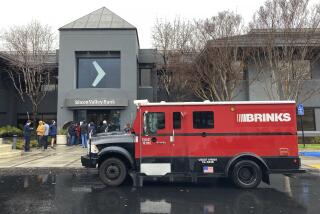Security Pacific Bank Seizes Cardis Account : Loan in Default; Firm on Edge of Bankruptcy
- Share via
Cardis Corp. was pushed to the brink of bankruptcy Monday as its major creditor, Security Pacific National Bank, declared a large loan in default and seized control of the troubled Buena Park auto parts distributor’s primary bank account.
Officials at Cardis and Security Pacific declined to discuss the reason for the bank’s action. But a company spokesman acknowledged that it could force a bankruptcy filing by Cardis, the West’s largest wholesaler of spark plugs, fan belts and other auto parts.
Cardis, which has more than $100 million in outstanding debt, owes Security Pacific $72.8 million, including a $34-million payment on a past due loan.
Cardis, which has lost more than $54 million in a little more than two years, received extensions on its loan payments in December. At the time, the firm was planning to sell its profitable Tuneup Masters quick-fix auto repair chain to help reduce its debt burden.
Benjamin Zitron, a member of an investment group that agreed last October to pay nearly $80 million in cash for the profitable Tuneup Masters subsidiary, said Monday that he was dismayed by the bank’s decision.
“We’re on the verge of closing the deal in the next day or two. I don’t know what the bank thinks it’s doing,” said Zitron, chairman of Great Neck, N.Y.-based Auto Spa, which operates 90 auto service outlets.
The bank account seizure, which gives Security Pacific greater control over the firm’s operations, leaves the future of Cardis in doubt, according to several industry observers. One option for the company would be to file for protection from creditors under Chapter 11 of the U.S. Bankruptcy Code.
Still Negotiating
Cardis spokesman David Olsen acknowledged that “Chapter 11 is obviously a logical step.”
“I don’t know what other choices they have,” said Jeffrey Kilpatrick, president of Newport Securities, a Costa Mesa brokerage.
Officials at Security Pacific said they are continuing to negotiate with Cardis. Other creditors, including some parts suppliers, are simply biding their time.
“We haven’t been paid interest by them for some time, but I have no choice but to wait,” said Bruce Gaudette, a vice president of securities investment at Massachusetts Mutual Life Insurance, a Cardis bondholder.
Cardis was founded in 1983 by a group of Beverly Hills investors who acquired a number of wholesale auto parts distributors in California, Arizona and Nevada. The firm bought established market leaders, betting that they would perform even better under one roof.
Although the company reported a profit in its second year, problems soon began to develop. By 1986, Cardis was losing money while its debt load continued to grow. Analysts generally attribute the company’s decline to overambitious expansion efforts.
“They bit off this big chunk, and the (profit) margins weren’t there to give them a return. Then they started cutting prices, and they were losing money,” said David Hererra, a purchasing agent at Lutzoff Automotive Warehouse in Los Angeles.
The company’s downfall was that “control of the company was not in the hands of people who were knowledgeable of the industry,” said William A. Raftery, president of the Motor & Equipment Manufacturers Assn. in Englewood Cliffs, N.J.
Influence Declined
“The plan could have worked,” added Lou Zuanich, executive vice president of the Automotive Warehouse Distributors Assn. in Kansas City, Mo. “But bringing independent distributors together under one umbrella has great risks.”
Auto parts distributors said that, although Cardis still is the leading auto parts distributor in California, its market leadership and influence have declined in the past year.
The company’s misfortunes have embittered famed auto racer Andy Granatelli, who sold his Tuneup Masters chain to Cardis in September, 1986. Granatelli is chairman of Tuneup Masters, but he is not on Cardis’ board of directors, and he said he has never been involved Cardis’ operations or negotiations with creditors.
“When I started my business, I never borrowed a penny. That’s not the way to do business,” Granatelli said.
More to Read
Inside the business of entertainment
The Wide Shot brings you news, analysis and insights on everything from streaming wars to production — and what it all means for the future.
You may occasionally receive promotional content from the Los Angeles Times.










